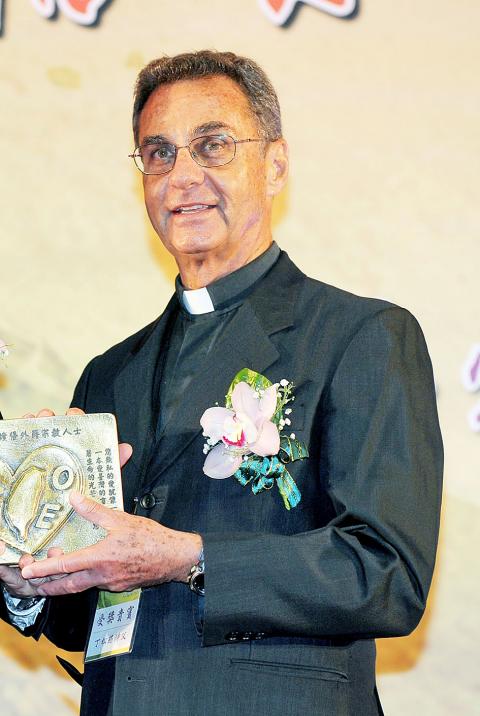Father George Martinson, who was slated to receive his national identification card today for more than 40 years of extraordinary service to the nation, has died at the age of 75, the Chinese Regional Bishops' Conference announced yesterday.
Martinson was also known as Uncle Jerry from his English teaching programs and his Chinese name Ting Sung-yun (丁松筠).
Father Cheng Juo-shih (程若石) said on Facebook that the Chinese Regional Bishops' Conference was assisting coroners in ascertaining when Martinson passed away and the cause of death.

Photo: CNA
Martinson arrived in Taiwan in 1957 and is perhaps best known for his work with Kuangchi Program Service (光啟社) and Giraffe English, where he encouraged children to learn English.
As the vice president of the Kuangchi Program Service, Martinson had steered the service’s television programming toward social issues relating to Aborigines, immigrant spouses, migrant workers, physically and mentally disabled people, victims of natural disasters and marginalized people, the National Immigration Agency said.
Under Martinson’s guidance, Kuangchi has spread very positive and educational information to these groups, the agency added.
Martinson also oversaw the shooting of the documentary Beyond the Killing Fields: Refugees on the Thai-Cambodian Border (殺戮戰場的邊緣), which received the Best Documentary Award at the 1986 Golden Horse Awards and the Best Short Film Award at the 1987 Asia Pacific Film Festival.
The National Immigration Agency had scheduled an event today for the conferral of a national identity card to Martinson at the Kuangchi Program Service Building. The event is to proceed as scheduled, but is to be changed to a commemoration ceremony.
The Chinese Regional Bishops' Conference said it would play a video recapping Martinson’s experiences, while inviting his friends to share their memories.
The agency applied for Martinson to be naturalized after the amended Nationality Act (國籍法) took effect last year, which allows foreign nationals with outstanding contributions to Taiwan to be naturalized as a Republic of China citizens while retaining their original citizenship.
The agency said that Martinson chose to forgo his original surname and use his adopted surname Ting, which the agency said showed his identification with Taiwan.
Martinson’s brother, Barry, was among the first five individuals naturalized after the amendments.
Barry Martinson lives in Hsinchu’s Wufong Township (五峰), having moved there 42 years ago.
He has been involved with Aboriginal communities for many years and established the first nursery in the county’s mountainous region.

MAKING WAVES: China’s maritime militia could become a nontraditional threat in war, clogging up shipping lanes to prevent US or Japanese intervention, a report said About 1,900 Chinese ships flying flags of convenience and fishing vessels that participated in China’s military exercises around Taiwan last month and in January last year have been listed for monitoring, Coast Guard Administration (CGA) Deputy Director-General Hsieh Ching-chin (謝慶欽) said yesterday. Following amendments to the Commercial Port Act (商港法) and the Law of Ships (船舶法) last month, the CGA can designate possible berthing areas or deny ports of call for vessels suspected of loitering around areas where undersea cables can be accessed, Oceans Affairs Council Minister Kuan Bi-ling (管碧玲) said. The list of suspected ships, originally 300, had risen to about

DAREDEVIL: Honnold said it had always been a dream of his to climb Taipei 101, while a Netflix producer said the skyscraper was ‘a real icon of this country’ US climber Alex Honnold yesterday took on Taiwan’s tallest building, becoming the first person to scale Taipei 101 without a rope, harness or safety net. Hundreds of spectators gathered at the base of the 101-story skyscraper to watch Honnold, 40, embark on his daredevil feat, which was also broadcast live on Netflix. Dressed in a red T-shirt and yellow custom-made climbing shoes, Honnold swiftly moved up the southeast face of the glass and steel building. At one point, he stepped onto a platform midway up to wave down at fans and onlookers who were taking photos. People watching from inside

Japan’s strategic alliance with the US would collapse if Tokyo were to turn away from a conflict in Taiwan, Japanese Prime Minister Sanae Takaichi said yesterday, but distanced herself from previous comments that suggested a possible military response in such an event. Takaichi expressed her latest views on a nationally broadcast TV program late on Monday, where an opposition party leader criticized her for igniting tensions with China with the earlier remarks. Ties between Japan and China have sunk to the worst level in years after Takaichi said in November that a hypothetical Chinese attack on Taiwan could bring about a Japanese

The WHO ignored early COVID-19 warnings from Taiwan, US Deputy Secretary of Health and Human Services Jim O’Neill said on Friday, as part of justification for Washington withdrawing from the global health body. US Secretary of State Marco Rubio on Thursday said that the US was pulling out of the UN agency, as it failed to fulfill its responsibilities during the COVID-19 pandemic. The WHO “ignored early COVID warnings from Taiwan in 2019 by pretending Taiwan did not exist, O’Neill wrote on X on Friday, Taiwan time. “It ignored rigorous science and promoted lockdowns.” The US will “continue international coordination on infectious